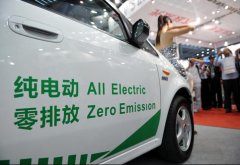by Jon LeSage, editor and publisher, Green Auto Market
Here’s my take on the 10 most significant and interesting occurrences during the past week…….
 Major feature on China and EVs: Automotive News has researched the deep interconnection between Chinese investors and electric vehicle manufacturers and suppliers – a trend that appears to be shaping the next phase of the global electric vehicle industry. Wheego Electric Cars, Smith Electric Vehicles, Protean Electric, A123 Systems, and Karma Automotive are being revived from financial crises and potential shutdowns through mergers and acquisitions tied into Chinese government incentives for EVs and restoration in markets like the U.S. and Europe.
Major feature on China and EVs: Automotive News has researched the deep interconnection between Chinese investors and electric vehicle manufacturers and suppliers – a trend that appears to be shaping the next phase of the global electric vehicle industry. Wheego Electric Cars, Smith Electric Vehicles, Protean Electric, A123 Systems, and Karma Automotive are being revived from financial crises and potential shutdowns through mergers and acquisitions tied into Chinese government incentives for EVs and restoration in markets like the U.S. and Europe.- NHTSA on self-driving cars: The National Highway Traffic Safety Administration is working on guidance to states, policymakers, and companies on self-driving vehicles that it hopes to release in July. NHTSA thinks major legal hurdles will have to be cleared before autonomous vehicles without steering wheels and gas pedals can be allowed to be sold in the U.S. NHTSA did tips its hat toward Google in February. The agency said that the artificial intelligence system piloting a self-driving Google car could be considered the driver under federal law. That could be a major step toward winning approval for self-driving vehicles on U.S. roads. NHTSA is looking into a Feb. 14 crash of a Google autonomous car into a municipal bus in Mountain View, Calif.; that may have been the first crash caused by an autonomous vehicle.
- Faraday in Nevada: Faraday Future has set up a $75 million bond, and set aside $13 million in an escrow account, to show that it can meet its financial obligations to gain approval to set up its electric car factory in North Las Vegas. The bond was required under a $215 million tax-incentive package approved by Nevada lawmakers in December, according to the Las Vegas Review-Journal.
- Millennial car buyers: Millennials may enjoy Uber, Lyft, Zipcar, and Car2Go, but they are starting to buy cars in big numbers. They are getting their drivers licenses later than did Baby Boomers and Generation Xers, but it is starting to happen. Millennials’ share of the new car market jumped to 28% last year, according to a J.D. Power and Associates study. In the country’s biggest car market, California, Millennials outpaced boomers for the first time. In past opinion surveys, Millennials/GenYers in their early 20s to mid-30s, have expressed a lot of interest in electric vehicles and hybrids. A new study by Kelley Blue Book concludes that while ridesharing and carsharing services are growing rapidly in transaction, it doesn’t necessarily mean that new car sales will go away. These fast-growing transportation services may actually present an opportunity for dealers and others in the auto industry.
- VW loses U.S. president: The Volkswagen diesel vehicle emissions reporting scandal took another sharp turn last week when VW Group of America announced the immediate departure of its president and CEO Michael Horn. Horn had been with VW since 1990. He was well-liked by VW dealers now struggling with vehicles they can’t sell and continuing public concern over the VW brand. The National Automobile Dealers Association issued a statement of concern over the impact it will have on VW dealers who have been hit hard by the scandal. In other news, about 300 institutional investors in Volkswagen have filed a $3.6 billion lawsuit in Germany. The suit states that these investors see as breaches of its capital markets duty in the emissions scandal.
- Fleet awards: Gladstein, Neandross & Associates, organizers of Advanced Clean Transportation (ACT) Expo, has teamed with Penske to launch the first-ever ACT Expo Fleet Award. The awards will recognize true leadership in sustainable transportation in several categories such as supply chain, good movement, shipper/carrier partnership, work truck, public fleet, and private fleet. The winners will be announced during ACT Expo 2016, which is being held May 2-5, 2016, at the Long Beach Convention Center in Long Beach, Calif.
- Ford has started a new division called Ford Smart Mobility LLC. Ford launched the Smart Mobility initiative in early 2015, which has conducted numerous experiments into how people get around. The automaker also launched several pilot programs, including an Uber-like shuttle service for employees, a car-sharing program, and an on-demand public bus service. The new division will create “commercially ready mobility services” and invest in outside ventures, the company said.
- GM buys Cruise Automation: General Motors is adding to its selection of urban mobility services with its acquisition of Cruise Automation, which makes a $10,000 aftermarket autonomous driving kit. The system uses radar sensors and other hardware that relay signals to in-car actuators to control the vehicle’s steering, brakes, and throttle. The companies did not disclose the price paid for GM’s acquisition.
- Jet biofuel: United Airlines has agreed to buy as much as 15 million gallons of sustainable biofuel over the next three years from AltAir Paramount’s refinery in Paramount, Calif. The biofuel blend cuts carbon emissions by more than 60% compared to with traditional jet fuel, the airline said. Flights between Los Angeles and San Francisco will be fueled by a blend of 30% biofuel and 70% petroleum.
- More biodiesel fraud: Federal prosecutors have enforced the Clean Air Act for another biodiesel fraud case. Philip Joseph Rivkin, the owner of a Texas biodiesel company, has been sentenced to 10 years in prison and fined $138 million for biofuels fraud. Rivkin created and sold more than 60 million false biodiesel credits under the federal renewable fuel program.



